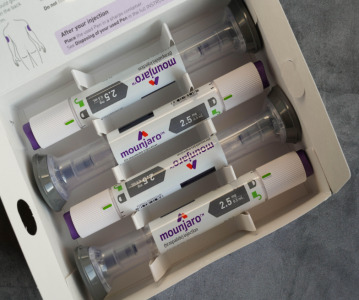FDA approves new indication for Faslodex (fulvestrant)

Approval expands use and offers additional option for women with HR+, HER2- metastatic breast cancer.
AstraZeneca has announced that the FDA has approved a new indication expanding the use of Faslodex (fulvestrant) to include use in combination with palbociclib. The combination use is for the treatment of women with hormone receptor-positive (HR+), human epidermal growth factor receptor 2 negative (HER2-) advanced or metastatic breast cancer (MBC) whose cancer has progressed after endocrine therapy. Faslodex has been approved since 2002 as a monotherapy for the treatment of postmenopausal women with HR+ MBC whose cancer has progressed following antiestrogen therapy.
Estrogen receptor (ER) positive breast cancer is the most common subtype of breast cancer and one of the key drivers of disease progression for this subtype is through the ER. Laboratory studies show that Faslodex directly targets the ER by blocking and degrading the ER, helping to inhibit tumour growth.
“The new Faslodex indication provides another important treatment option for patients, as described in the study, who progressed on or early after prior endocrine therapy. The data supporting combination therapy with Faslodex plus palbociclib showed a clear increase in progression-free survival in patients in the combination arm, as compared to Faslodex and placebo,” said Dr Dennis Slamon, Professor of Medicine, Chief of the Division of Hematology/Oncology and Executive Vice Chair for Research for UCLA's Department of Medicine.
The FDA approval of this new indication for Faslodex is based on data from the Phase III PALOMA-3 trial, which met the study’s primary endpoint of progression-free survival (PFS). The combination of Faslodex 500 mg and palbociclib 125 mg resulted in a 4.9 month PFS improvement over Faslodex and placebo, in women with HR+ HER2- advanced or MBC whose disease had progressed after endocrine therapy. Improvement in PFS was seen irrespective of menopausal status.
“We believe that advances in cancer treatment will come, in part, from our research building upon existing treatments. This new indication adds to the existing body of evidence supporting Faslodex-based therapy for certain metastatic breast cancer patients in an area where there is still a high unmet medical need,” said Andrew Coop, Vice President, US Medical Affairs, Oncology at AstraZeneca.
Related News
-
News The next 15 drugs up for negotiation with Medicare include several blockbusters
By now, everyone is quite familiar with the drug price negotiations taking place between drug companies and the Centres for Medicare & Medicaid Services (CMS) in the USA as part of measures being taken to reduce the cost of drugs for patients, to make ... -
News PSCI Welcomes Delpharm, Samsung Biologics, and Suven as First Supplier Partners
The pharmaceutical industry continues to evolve with an increasing focus on responsible sourcing, sustainability, and collaboration across the supply chain. Under a new model to recognise suppliers within the pharmaceutical and healthcare industry that... -
News Drug prices agreed upon as part of the US Inflation Reduction Act
The Inflation Reduction Act brought into constitution by the Biden administation in 2022, which proposed a drug price negotiation between the government and pharmaceutical companies, has reached it's first agreement. -
News Eisai Alzheimer’s drug authorised in UK but still faces obstacles
In partnership with BioArctic AB, pharmaceutical company Eisai has been granted Marketing Authorisation by the Medicines and Healthcare products Regulatory Agency (MHRA) for its Alzheimer’s disease drug product Leqembi. -
News Eli Lilly's weight loss drugs removed from the FDA's shortage list
The US FDA have recently updated their drug shortage list. The recently released list shows that all dosage forms of Eli Lilly's weight-loss drug Zepbound and their diabetes drug Mounjaro are now available. -
News Global advancements in the diagnosis and treatment of rare diseases: Rare Disease Day 2024
Rare Diseases Day is celebrated on the 29th February 2024 and represents the plight of rare disease patients to gain diagnosis and access to suitable treatment. -
News Pharmaceutical industry supports COP28 health stance in joint statement
As COP28 takes place over this week in Dubai, UAE, several bodies in the pharmaceutical and health industries have come together to announce support of key movements in sustainability in the sector, and to recognise sustainability as a health issue.&nb... -
News Biden backs Cold-War measures to shore-up medical supply chains
In a recent strategy to combat rising inflation and the cost of living crisis, President Joe Biden has invoked a Cold War-era act to increase investment in a selection of medicines and supplies.
Recently Visited
Position your company at the heart of the global Pharma industry with a CPHI Online membership
-
Your products and solutions visible to thousands of visitors within the largest Pharma marketplace
-
Generate high-quality, engaged leads for your business, all year round
-
Promote your business as the industry’s thought-leader by hosting your reports, brochures and videos within your profile
-
Your company’s profile boosted at all participating CPHI events
-
An easy-to-use platform with a detailed dashboard showing your leads and performance



.png)



